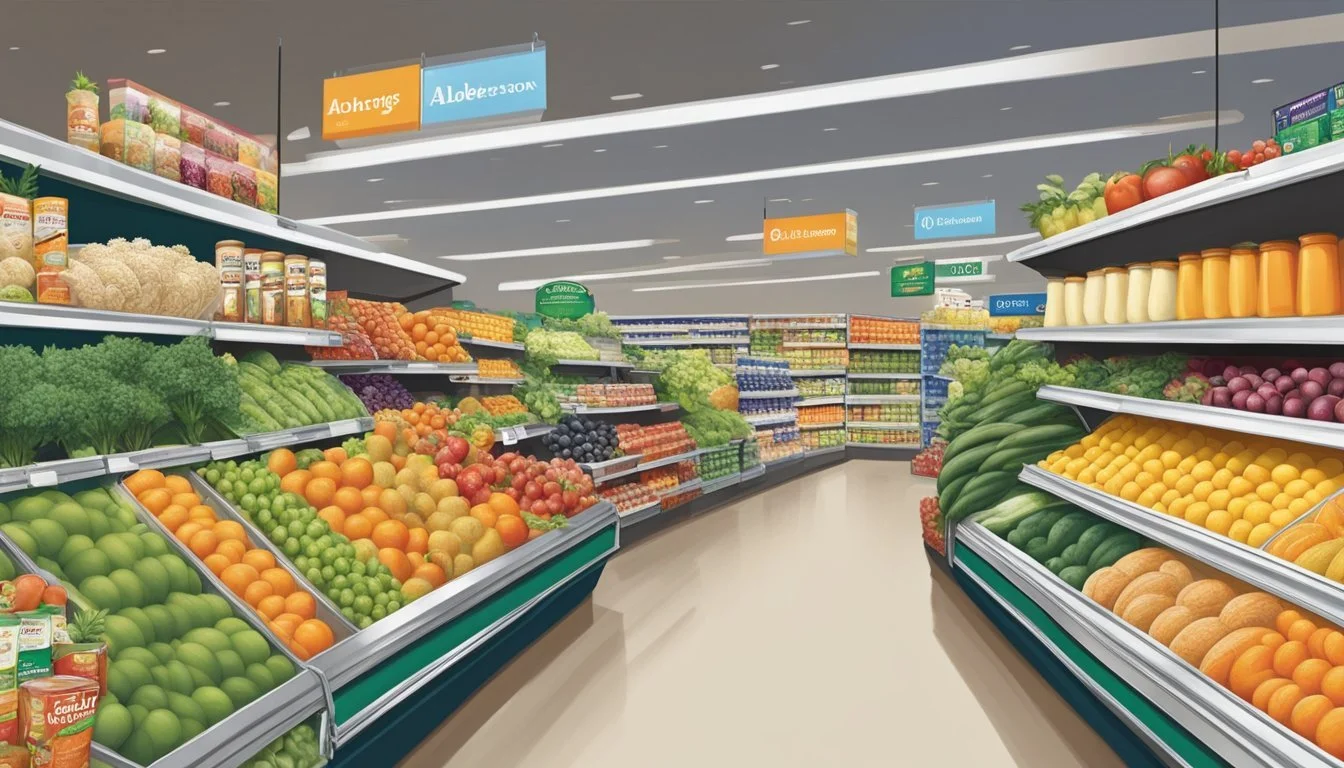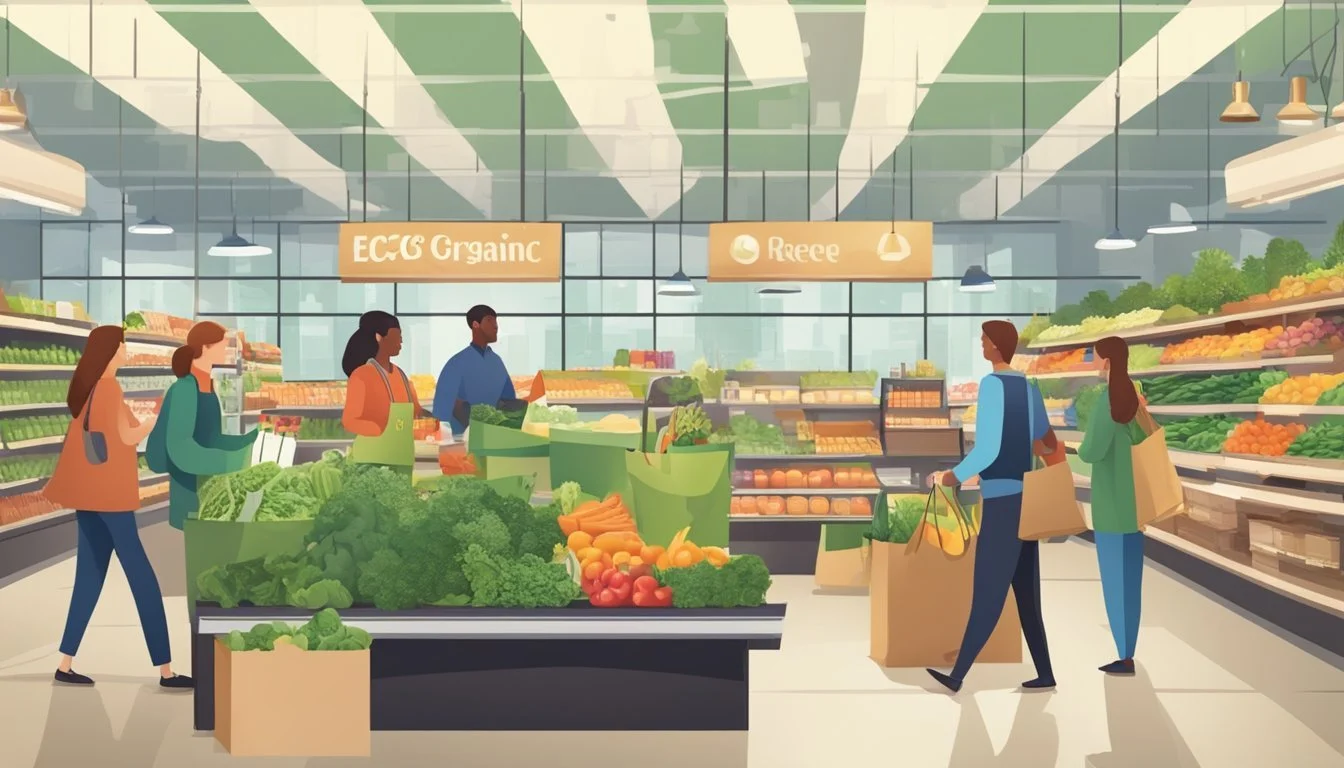Albertsons vs Ingles Markets
Comparing Price, Quality, and Service
Albertsons and Ingles Markets are two prominent grocery store chains serving different regions of the United States. Both offer a wide range of products to meet customers' daily shopping needs.
Albertsons generally provides a larger selection and more store locations, while Ingles Markets focuses on serving the southeastern region with a emphasis on fresh, local products. Albertsons operates over 2,200 stores across 34 states, offering a diverse array of national brands and private label items. Ingles Markets, on the other hand, has a more concentrated presence with approximately 200 stores in six southeastern states.
The choice between these two supermarkets often comes down to personal preference and location. Albertsons tends to have more competitive pricing on national brands, while Ingles Markets prides itself on its produce department and in-store bakeries. Both chains strive to provide quality products and customer service, catering to the specific needs of their respective markets.
Company Histories and Market Presence
Albertsons and Ingles Markets have distinct origins and growth trajectories. Both companies have expanded their presence over decades, though in different regions of the United States.
Albertsons' Evolution and Expansion
Joe Albertson founded Albertsons in 1939, opening the first Albertson's Food Center in Boise, Idaho. The company incorporated in 1945 and went public in 1959.
Albertsons expanded rapidly in the 1950s, entering markets in Washington, Utah, Oregon, and Montana. This growth continued over the following decades.
As of 2024, Albertsons operates over 2,270 stores across the United States. The company employs approximately 290,000 people, making it one of the largest supermarket chains in North America.
Albertsons has pursued growth through mergers and acquisitions. These strategic moves have helped solidify its position as the second-largest supermarket chain in North America, behind only Kroger.
Ingles Markets' East Coast Roots
Ingles Markets was founded in 1963, focusing primarily on the southeastern United States. The company went public in the 1980s.
Ingles Markets operates 188 stores across six states: North Carolina, South Carolina, Georgia, Virginia, Tennessee, and Alabama. This regional concentration contrasts with Albertsons' national presence.
The company employs around 11,000 people, significantly fewer than Albertsons but still a major employer in its operating areas.
Ingles Markets has maintained a steady growth strategy, expanding within its core East Coast markets. This approach has allowed the company to build strong regional brand recognition and customer loyalty.
Store Location and Accessibility
Albertsons and Ingles Markets have distinct geographic footprints that shape their accessibility for shoppers. Their store locations reflect different regional strategies and market focuses.
Albertsons' Geographic Footprint
Albertsons operates stores across a wide swath of the United States. The company has a strong presence in the western states, particularly in Arizona and southern California. Phoenix is a key market for Albertsons, with numerous locations serving the metropolitan area.
Albertsons also maintains stores in the Pacific Northwest, with Seattle being another important hub. The chain's reach extends to the Midwest and parts of the east coast, though its coverage is less dense in these regions.
Ingles Markets' Regional Focus
Ingles Markets takes a more concentrated approach to its store locations. The company primarily serves the southeastern United States, with a particularly strong presence in North Carolina, South Carolina, Georgia, and Tennessee.
Ingles Markets does not have stores in Arizona, California, or Washington. Its regional focus allows the company to tailor its offerings to local preferences and maintain a strong community presence in its core markets.
This strategy differs from Albertsons' wider geographic spread but may offer advantages in terms of local market knowledge and supply chain efficiency.
Product Range and Quality
Albertsons and Ingles Markets offer distinct product ranges and prioritize quality differently. Both chains strive to meet customer needs but take unique approaches to their selections and freshness standards.
Albertsons' Selection
Albertsons boasts a wide variety of products across multiple categories. Their produce section features both conventional and organic options, catering to diverse customer preferences. The meat department offers a range of cuts, including beef, pork, chicken, and turkey from reputable suppliers.
Albertsons' in-house brands provide value-oriented alternatives to national brands. Their O Organics line meets strict USDA organic standards. The store's bakery and deli sections offer freshly prepared items daily.
Specialty departments like international foods and health-focused products expand Albertsons' appeal to niche markets. The chain also stocks an extensive selection of grocery staples, frozen foods, and household items.
Ingles Markets' Freshness Focus
Ingles Markets emphasizes fresh, locally-sourced products. Their produce department showcases a variety of seasonal fruits and vegetables, with many items sourced from regional farms. This approach supports local agriculture and ensures peak freshness.
The meat counter at Ingles features high-quality cuts, often from local suppliers. Butchers offer custom cuts and grinding services. Ingles' commitment to freshness extends to their seafood department, with regular deliveries of fish and shellfish.
Ingles Markets operates their own dairy, ensuring a steady supply of fresh milk and other dairy products. Their bakery produces artisanal bread and pastries daily. The deli offers made-to-order sandwiches and prepared meals for convenient dining options.
Pricing and Value for Money
Albertsons and Ingles Markets offer different pricing strategies and value propositions for shoppers. Their everyday prices and promotional offerings can impact overall grocery costs for customers.
Comparing Everyday Prices
Albertsons tends to have slightly higher everyday prices compared to Ingles Markets. A typical shopping basket at Albertsons costs about 5-10% more than at Ingles. However, Albertsons often stocks a wider variety of premium and organic products, which can influence average prices.
Ingles Markets positions itself as a value-oriented grocer. Their focus on regional sourcing helps keep prices competitive, especially on produce and dairy items. Ingles' store brand products are usually priced 10-15% lower than national brands.
Deals and Savings Opportunities
Both chains offer weekly sales and digital coupons to help customers save. Albertsons' Just for U loyalty program provides personalized deals and gas rewards. Members can save up to 20% on select items each week.
Ingles Markets runs frequent "10 for $10" promotions on staple items. Their Ingles Advantage Card gives shoppers access to digital coupons and fuel points. Ingles also offers a senior discount day, providing 5% off on Tuesdays for shoppers 60 and older.
Albertsons typically has more manufacturer coupons available, while Ingles focuses on store-specific discounts. Both chains price-match local competitors, helping savvy shoppers maximize savings.
Shopping Experience and Customer Service
Albertsons and Ingles Markets strive to provide positive shopping experiences through store layout, customer service, and convenience features. Both chains focus on meeting consumer needs, but differ in their approaches to creating satisfaction.
Store Layout and Navigation
Albertsons employs a well-organized layout with clear signage to help customers navigate easily. Aisles are typically arranged by product categories, making it simple to find items. The stores often feature wide aisles and bright lighting to enhance the shopping experience.
Ingles Markets takes pride in its clean, spacious stores. They organize products logically, with produce sections prominently displayed near the entrance. Many Ingles locations include specialized departments like bakeries and delis, adding convenience for shoppers.
Both chains offer self-checkout options to reduce wait times. Albertsons has been expanding its online shopping and curbside pickup services, while Ingles has been slower to adopt these technologies in some markets.
Customer Satisfaction and Service
Albertsons emphasizes customer service training for its workers. They aim to create a friendly, helpful atmosphere. The chain offers a loyalty program that provides personalized deals and savings opportunities for frequent shoppers.
Ingles Markets focuses on maintaining a community-oriented feel in its stores. They often hire locally and train staff to be knowledgeable about products. This approach can lead to more personalized interactions with customers.
Consumer Reports and other survey data show mixed results for both chains. Ratings tend to vary by location, with some stores receiving high marks for service while others lag behind. Both companies actively seek customer feedback to improve their offerings and address concerns.
Checkout efficiency is a priority for both chains, with efforts to reduce waiting times during peak hours. Albertsons has been investing in technology to streamline the process, while Ingles maintains a focus on personal service at the register.
Ethical and Sustainable Practices
Albertsons and Ingles Markets have implemented various initiatives to address environmental and social concerns. Both companies focus on corporate responsibility and sustainable sourcing practices.
Corporate Responsibility Initiatives
Albertsons emphasizes community engagement through its Recipe for Change program. The company aims to reduce food waste and fight hunger by donating surplus food to local food banks. Albertsons has also set goals to decrease energy consumption and greenhouse gas emissions in its stores and distribution centers.
Ingles Markets supports local communities through charitable donations and sponsorships. The company focuses on education, health, and youth programs. Ingles has implemented energy-efficient lighting and refrigeration systems in its stores to reduce environmental impact.
Sustainable and Ethical Sourcing
Albertsons has committed to sustainable seafood sourcing, with a goal to ensure all seafood is sustainably sourced by 2025. The company works with suppliers to improve animal welfare standards and increase its organic product offerings.
Ingles Markets partners with local farmers to source fresh produce, supporting regional agriculture. The company offers a growing selection of organic and natural products to meet consumer demand for healthier options.
Both retailers have introduced private-label organic product lines. Albertsons' O Organics brand and Ingles' Laura Lynn Organics provide customers with more affordable organic choices.
Financial Performance and Market Competitiveness
Albertsons and Ingles Markets have distinct financial profiles and market positions. Their revenue, profitability, and competitive strategies shape their standing in the grocery industry.
Revenue and Profitability Analysis
Albertsons generates significantly higher revenue than Ingles Markets due to its larger scale. In 2023, Albertsons reported annual revenues exceeding $77 billion, while Ingles Markets' revenues were around $5 billion.
Ingles Markets boasts stronger operating margins at 4.3%, compared to Albertsons' 2.1-2.6%. This indicates Ingles' efficiency in controlling costs relative to sales.
Albertsons' broader market presence provides economies of scale, but also higher operational costs. Ingles' regional focus allows for streamlined operations and potentially higher profit margins.
Market Share and Competitive Edge
Albertsons holds a larger market share with over 2,270 stores across North America. Its diverse portfolio of subsidiaries, including Safeway and Jewel-Osco, strengthens its competitive position.
Ingles Markets operates primarily in the Southeastern United States, with a more concentrated regional presence. This focus allows for tailored strategies to local consumer preferences.
Both companies face intense competition from retail giants like Kroger and Walmart. Albertsons' scale provides negotiating power with suppliers, while Ingles' regional expertise offers a loyal customer base.
Albertsons' recent underperformance in the stock market, lagging 17.99% behind broader indices, highlights challenges in maintaining growth amid fierce competition.
Conclusion
Albertsons and Ingles Markets both offer distinct advantages to consumers. Albertsons provides a wider geographic reach with its large network of stores across the United States. The company's size allows for potentially greater economies of scale.
Ingles Markets focuses on the southeastern region, operating 201 locations. This regional concentration enables Ingles to tailor its offerings to local preferences. The chain emphasizes competitive pricing on its products.
Quality and selection vary between the two retailers. Albertsons typically stocks a broad range of national brands and private label items. Ingles Markets aims to provide fresh, high-quality produce and meats to appeal to southeastern shoppers.
Price-conscious consumers may find better deals at Ingles Markets, known for its low price levels. However, individual store pricing can fluctuate based on location and market conditions.
Store locations play a crucial role in consumer choice. Albertsons' wider presence offers convenience for shoppers in many areas. Ingles' regional focus means fewer stores but potentially deeper community connections.
Ultimately, the better option depends on individual shopper priorities. Those valuing nationwide accessibility may prefer Albertsons. Customers seeking regional specialization and competitive prices might choose Ingles Markets.
Both supermarkets strive to meet consumer needs in today's competitive grocery market. Shoppers benefit from comparing offerings at their local Albertsons and Ingles Markets stores.








